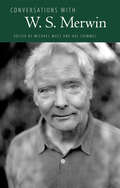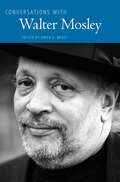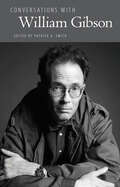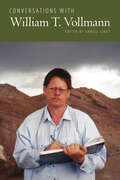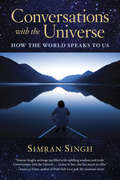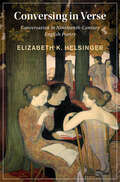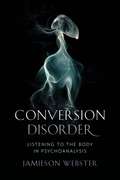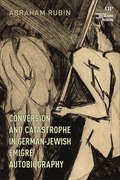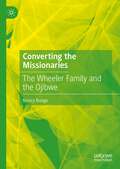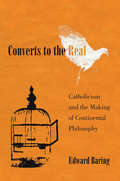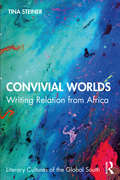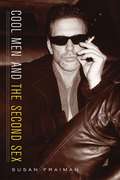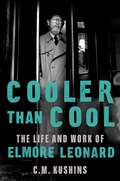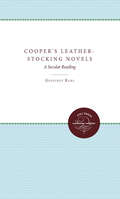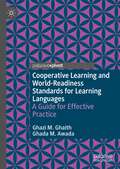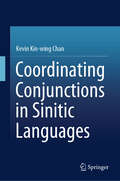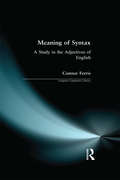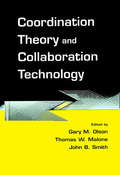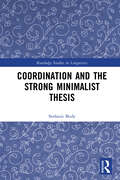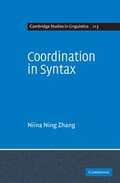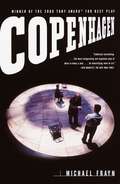- Table View
- List View
Conversations with W. S. Merwin (Literary Conversations Series)
by Michael Wutz and Hal CrimmelConversations with W. S. Merwin is the first collection of interviews with former United States Poet Laureate W. S. Merwin (b. 1927). Spanning almost six decades of conversations, the collection touches on such topics as Merwin's early influences (Robert Graves and Ezra Pound), his location within the twin poles of Walt Whitman and Henry David Thoreau, and his extraordinary work as a translator, as well as his decades-long interest in environmental conservation. Anticipating the current sustainability movement and the debates surrounding major and minor literatures, Merwin was, and still is, a visionary.He is among the most distinguished poets, translators, and thinkers in the United States. A major link between the period of literary modernism and its contemporary extensions, Merwin has been a force in American letters for many decades, and his translations from the Spanish, French, Italian, Japanese, and other languages have earned him unanimous praise and admiration. Merwin also wrote at the forefront of literature's environmental advocacy and early on articulated concerns about ecology and sustainability.Conversations with W. S. Merwin offers insight into the various dimensions of Merwin's thought by treating his interviews as a self-standing category in his oeuvre. More than casual narratives that interpret the occasional poem or relay an occasional experience, they afford literary and cultural historians a view into the larger throughlines of Merwin's thinking.
Conversations with Walter Mosley (Literary Conversations Series)
by Owen E. BradyThe interviews in this collection cover Walter Mosley's career and reveal an overarching theme: a belief in the transformative power of reading and writing. Since the 1990 publication of his first novel, Devil in a Blue Dress, Mosley (b. 1952) has published over thirty books in a tremendous range of genres and modes: crime and detective fiction, science fiction, literary novels of ideas, character studies, political and social nonfiction, erotica, and memoir. Best known for his Easy Rawlins detective series and Socrates Fortlow series of crime novels, Mosley has created a body of work that as a whole chronicles and examines twentieth-century African American experience. Conversations with Walter Mosley covers the breadth of Mosley's career and reveals a craftsman and wryly witty conversationalist. Conscious of his forebears as well as literary techniques, he discusses favorites and influences including Camus, Shakespeare, and Dickens as well as writers in popular genres—especially speculative fiction and the hard-boiled noir detective tradition. He also discusses how his work modifies the crime tradition to engage it with black experience.
Conversations with William Gibson (Literary Conversations Series)
by Patrick A. Smith“After reading Neuromancer for the first time,” literary scholar Larry McCaffery wrote, “I knew I had seen the future of [science fiction] (and maybe of literature in general), and its name was William Gibson.” McCaffery was right. Gibson's 1984 debut is one of the most celebrated SF novels of the last half century, and in a career spanning more than three decades, the American-Canadian science fiction writer and reluctant futurist responsible for introducing “cyberspace” into the lexicon has published nine other novels. Editor Patrick A. Smith draws the twenty-three interviews in this collection from a variety of media and sources—print and online journals and fanzines, academic journals, newspapers, blogs, and podcasts. Myriad topics include Gibson's childhood in the American South and his early adulthood in Canada, with travel in Europe; his chafing against the traditional SF mold, the origins of “cyberspace,” and the unintended consequences (for both the author and society) of changing the way we think about technology; the writing process and the reader's role in a new kind of fiction. Gibson (b. 1948) takes on branding and fashion, celebrity culture, social networking, the post-9/11 world, future uses of technology, and the isolation and alienation engendered by new ways of solving old problems. The conversations also provide overviews of his novels, short fiction, and nonfiction.
Conversations with William T. Vollmann (Literary Conversations Series)
by Daniel LukesAcross fiction, journalism, ethnography, and history, William T. Vollmann’s oeuvre—which includes a “prostitution trilogy,” a septology (Seven Dreams) about encounters between first North Americans and European colonists, and a more-than-three-thousand-page philosophical treatise on violence—is as ambitious as it is dazzling. Conversations with William T. Vollmann collects twenty-nine interviews, from early press coverage in Britain where his career first took flight, to in-depth visits to his writing and art studio in Sacramento, California. Throughout these conversations, Vollmann (b. 1959) speaks with candor and wit on such subjects as grief and guilt in his work, his love of guns and his experience of war, the responsibilities of the artist as witness, the benefits of looking out into the world beyond the confines of one’s horizon, the limitations of what literature can achieve, and how we can speak to the future. Bringing to the fore several expanded, unpublished, and hard-to-find interviews, this volume offers a valuable set of perspectives on a uniquely rewarding and sometimes overwhelming writer. On the road promoting his books or in a domestic setting, Vollmann comes across as reflective and humane, humble in his craft despite deep dedication to his uncompromising vision, and ever armed with a spirit of mischief and capacity to shock and unsettle the reader.
Conversations with the Universe
by Simran SinghThis book reveals how repetitions, coincidence and synchronicity are part of a personal conversation from the Universe, intended to provide ease and guidance. We are not alone, nor have we been creating life experiences on our own. There is a co-creative Universal Intelligence who is very much involved and continually seeking a dialogue. The problem is not so much the life challenges, but our own individual lack of communication with our co-creator. A conversation is happening all of the time, but we must open our eyes and ears to it. When we do, an opportunity to reconnect with the lighter side of life ensues. We do not have to get wrapped up in the heaviness. Instead of becoming overwhelmed by the issues at hand, we can become aware of the answers and solutions constantly presenting themselves. The Universe wants us to be joyful, have fun, and let go. The synchronicities, symbols, and messages are always intended to guide us. They are there to make us smile, to stop to remember there is more to life than the current object of our perceptions. Instead of having to work things out, we can play them out, yielding more aligned outcomes and a greater experience. When we are able to remember the vast connection that exists, the illusions we live become more and more apparent. Greater awareness of the messages and engagement in the dialogue allows us to laugh with the heavens at ourselves at life and our seriousness.
Conversing in Verse: Conversation in Nineteenth-Century English Poetry (Cambridge Studies in Nineteenth-Century Literature and Culture)
by Elizabeth HelsingerConversing in Verse considers poems of conversation from the late eighteenth into the twentieth centuries – the very period when a more restrictive conception of poetry as the lyric product of the poet's solitary self-communing became entrenched. With fresh insight, Elizabeth Helsinger addresses a range of questions at the core of conversational poetry: When and why do poets turn to conversation to explore poetry's potential? How do conversation's forms and intentions shape the figures, rhythms, and prosody of poems to alter the reader's experience? What are the ethical and political stakes of conversing in verse? Coleridge, Clare, Landor, Tennyson, Robert Browning, Christina and Dante Gabriel Rossetti, Swinburne, Michael Field, and Hardy each composed poems that open difficult or impossible conversations with phenomena outside themselves. Helsinger unearths an unfamiliar lyric history that produced some of the most interesting formal experiments of the nineteenth century, including its best known, the dramatic monologue.
Conversion Disorder: Listening to the Body in Psychoanalysis
by Jamieson WebsterConversion disorder—a psychiatric term that names the enigmatic transformation of psychic energy into bodily manifestations—offers a way to rethink the present. With so many people suffering from unexplained bodily symptoms; with so many seeking recourse to pharmacological treatments or bodily modification; with young men and women seemingly willing to direct violence toward anybody, including themselves—a radical disordering in culture insists on the level of the body.Part memoir, part clinical case, part theoretical investigation, this book searches for the body. Is it a psychopathological entity; a crossroads for the cultural, political, and biological in the form of care; or the foundation of psychoanalytic work on the question of sexuality? Jamieson Webster traces conversion’s shifting meanings—in religious, economic, and even chemical processes—revisiting the work of thinkers as diverse as Benjamin, Foucault, Agamben, and Lacan. She provides an intimate account of her own conversion from patient to psychoanalyst, as well as her continuing struggle to apprehend the complexities of the patient’s body. When listening to dreams, symptoms, worries, or sexual impasses, the body becomes a defining trope that belies a vulnerable and urgent wish for transformation. Conversion Disorder names what is singular about the entanglement of the fractured body and the social world in order to imagine what kind of cure is possible.
Conversion and Catastrophe in German-Jewish Émigré Autobiography (German and European Studies #55)
by Abraham RubinConversion and Catastrophe in German-Jewish Émigré Autobiography is a collective biography of four German-Jewish converts to Christianity, recounting their spiritual and confessional journeys against the backdrop of the Holocaust and its aftermath. Focusing on personal testimonies that fuse historical trauma and spiritual illumination into one narrative, the book explores how Jewish emigrants interpreted their experiences of persecution and displacement through the hermeneutics of Christian conversion. It draws on autobiographies, novels, religious writings, and newspaper articles as well as unpublished archival materials such as diaries, lecture notes, and private correspondence. The book explores how chosen genres of writing both enabled and hindered self-understanding. It also assesses whether the literary paradigm of Christian conversion, highlighting an individual’s separation from a past sinful self, is suitable for expressing a collective catastrophe. Applying psychoanalysis, disability studies, and autobiographical theory to the life writing of converted Jews, the book offers new avenues for conceptualizing the Jewishness of historical subjects who disavowed their ties to Judaism. Published in association with the United States Holocaust Memorial Museum.
Converting the Missionaries: The Wheeler Family and the Ojibwe
by Nancy BungeThis book tells the uncommon story of a missionary family in the Midwestern United States, and their interactions with the indigenous Ojibwe. When Leonard and Harriet Wheeler arrived at La Pointe, Wisconsin in July of 1841, hoping to help the Ojibwe understand and accept the value of Christian civility, they did not expect such a profound transformation of their own lives. The Wheelers’ empathy for the Ojibwe not only grew during their twenty-five years of mission work in Northern Wisconsin, much of it spent trying to protect the Ojibwe from predatory whites, it also influenced the lives of their children.
Converts to the Real: Catholicism and the Making of Continental Philosophy
by Edward BaringPhenomenology has the strongest claim to the mantle of continental philosophy. Edward Baring shows that credit for its prodigious growth goes to a surprising group of early enthusiasts: Catholic intellectuals. Tracing debates in Europe from existentialism to speculative realism, he shows why European philosophy bears the mark of Catholicism.
Convivial Worlds: Writing Relation from Africa (Literary Cultures of the Global South)
by Tina SteinerThis book discovers everyday forms of conviviality in fiction and life writing from Eastern and Southern Africa. It focuses on ordinary moments of recognition, of hospitality, of humour and kindness in everyday life to illuminate the significance of repertoires of repair in a world broken by relations of power. Through close readings of specific capacities of living with difference, the book excavates ideas of world-making, personhood and the possibilities of alternative social imaginaries from African perspectives. It highlights evanescent and more durable attempts at building solidarity across local and translocal settings by focussing on modes of address that invite reciprocity in contexts of injustice, which include Apartheid, colonialism, racism, patriarchy and xenophobia. Putting current research on conviviality in conversation with the literary texts, the book demonstrates how conviviality emerges as an enabling ethical practice, as critique and survival strategy and as embodied lived experience. The volume will be of great interest to scholars and researchers of Literary and Cultural Studies, especially Postcolonial Literature, African Studies and Indian Ocean Studies.
Cool Characters: Irony and American Fiction
by Lee KonstantinouLee Konstantinou examines irony in American literary and political life, showing how it migrated from the countercultural margins of the 1950s to the 1980s mainstream. Along the way, irony was absorbed into postmodern theory and ultimately become a target of recent writers who have moved beyond its limitations with a practice of "postirony."
Cool Men and the Second Sex
by Susan FraimanFraiman assesses the work of various contemporary male figures--"bad boy" innovative filmmakers Quentin Tarantino, Brian De Palma, and Spike Lee and such "celebrity" professors as Edward Said, Andrew Ross, Henry Louis Gates Jr., and Lee Edelman--all of them on the left. She argues that despite their hipness--or because of it--these men consistently relegate women to the margins and feel free to ignore the insights of feminist scholars. Fraiman discusses movies like Pulp Fiction and Do the Right Thing, as well as other popular forms from pornography to rap music.
Cool Men and the Second Sex (Gender and Culture Series)
by Susan FraimanAcademic superstars Andrew Ross, Edward Said, and Henry Louis Gates Jr. Bad boy filmmakers Quentin Tarantino, Spike Lee, and Brian de Palma. What do these influential contemporary figures have in common? In Cool Men and the Second Sex, Susan Fraiman identifies them all with "cool masculinity" and boldly unpacks the gender politics of their work. According to Fraiman, "cool men" rebel against a mainstream defined as maternal. Bad boys resist the authority of women and banish mothers to the realm of the uncool. As a result, despite their hipness—or because of it—these men too often feel free to ignore the insights of feminist thinkers. Through subtle close readings, Fraiman shows that even Gates, champion of black women's writing, and even queer theorists bent on undoing gender binaries, at times end up devaluing women in favor of men and masculinity.A wide-ranging and fair-minded analysis, Cool Men acknowledges the invaluable contributions of its subjects while also deciphering the gender codes and baring the contradictions implicit in their work. Affirming the legacy of second-wave feminist scholars and drawing as well on the intersectional work of third-wavers, Cool Men helps to reinvent feminist critique for the twenty-first century.
Cooler Than Cool: The Life and Work of Elmore Leonard
by C. M. KushinsDrawing on unprecedented archival and family access, Cooler Than Cool: The Life of Elmore Leonard, is the first comprehensive biography of the master American crime writer, author of witty, gritty bestsellers like Get Shorty and Raylan.Over the course of his sixty-year career, Elmore Leonard, “the Dickens of Detroit,” published forty-five novels that have had enduring appeal to readers around the world. Revered by Martin Amis, Margaret Atwood, Raymond Carver, and Stephen King, his books were innovative in their blending of a Hemingway-inspired noirish minimalism and a masterful use of realistic dialogue over exposition—a direct evolution spurred by his years as a screenwriter.Leonard’s fiction contained many layers, and at the heart of his work were progressive themes, stemming from his years as a student of the Jesuit religious order, his personal beliefs in social justice, and his successful battle over alcoholism. He drew inspiration from greats like Raymond Chandler and Dashiell Hammett, but the true motivation and brilliance behind his crime writing was the ongoing class struggle to achieve the American Dream—often seen through the eyes of law enforcement officers and the criminals they vowed to apprehend.C. M. Kushins tells Leonard’s full life story against recurring themes and evolving storytelling methods of his work, drawing on interviews with primary sources ranging from Leonard’s family and friends to those who acted in, produced, and directed his work onscreen. He also includes never-before-published excerpts from Leonard’s unfinished final novel and planned memoir. Definitive and revealing, Cooler Than Cool shows Leonard emerging as one of the last writers of the “pulp fiction” era of midcentury America, to ultimately become one of the most successful storytellers of the twentieth century, whose influence continues to have far-reaching effects on both contemporary crime fiction and American filmmaking.
Cooper's Leather-Stocking Novels: A Secular Reading
by Geoffrey RansJames Fenimore Cooper's Leather-Stocking tales, published between 1823 and 1841, are generally regarded as America's first major works of fiction. Here, Geoffrey Rans provides not simply a new reading of the five novels that comprise the series but also a new way of reading them.Rans analyzes each of the five novels (The Pioneers, The Last of the Mohicans, The Prairie, The Pathfinder, and The Deerslayer) in the order in which they were originally composed, an achronological sequence in terms of the stories they tell. As events in early written novels interact with those in later ones, the reader is compelled to construct political meanings different from Cooper's ideological preferences. This approach effectively precludes reading these works as Natty Bumppo's life story, or as an aspect of Cooper's. Rans presents the series as a text that faithfully reproduces the conflicts Cooper faced, both at the time when he wrote the novels and in the history that the novels contemplate.Cooper emerges as a composer of richly problematical texts for which no aesthetic resolution is possible and in which every idealization, political or poetic, is relentlessly subjected to the gaze of historical reality. The tension between potential and practice, which is apparent in the final two volumes of the tales, is present, Rans contends, from the inception of the series. Because the problems of racism and greed that Cooper addresses remained as unresolved for us as for him, Rans concludes that this reading of the Leather-Stocking tales reinforces both Cooper's central canonical position and his value as an articulator of political conflict.Originally published in 1991.A UNC Press Enduring Edition -- UNC Press Enduring Editions use the latest in digital technology to make available again books from our distinguished backlist that were previously out of print. These editions are published unaltered from the original, and are presented in affordable paperback formats, bringing readers both historical and cultural value.
Cooperative Learning and World-Readiness Standards for Learning Languages: A Guide for Effective Practice
by Ghazi M. Ghaith Ghada M. AwadaThis book provides curriculum planners, materials developers, and language educators with curricular perspectives and classroom activities in order to address the needs of learners of English as a global lingua franca in an increasingly globalized and interdependent world. The authors argue that language educators would benefit from synthesizing and using research and evidence-based cooperative learning methods and structures to address the current world-readiness standards for learning languages in the five domains of Communication, Cultures, Connections, Comparisons, and Communities. The book outlines the main cooperative learning principles of heterogenous grouping, positive interdependence, individual accountability, social/collaborative skills, and group processing, then demonstrates their relevance to language teaching and learning. This book will be of interest to students in pre-service teacher education programmes as well as in-service practitioners, teacher trainers and educational administrators.
Coordinating Conjunctions in Sinitic Languages
by Kevin Kin-wing ChanThe book is a comprehensive typological study of coordinating conjunctions in Sinitic languages and other languages worldwide, focusing on the grammaticalization pathways through which conjunctions emerge. Utilizing an extensive database of coordinating conjunctions, including first-hand data from 234 Chinese dialects and 45 non-Sinitic languages, as well as 830 sets of second-hand data, this research aims to reconstruct the primary grammaticalization paths of coordinating conjunctions in Sinitic languages while making typological generalizations and classifications. The study contributes to the understanding of how coordinating conjunctions develop in various languages and sheds light on the typological patterns that emerge across languages.
Coordinating Information and Communications Technology Across the Primary School: A Study in the Adjectives of English (Longman Linguistics Library)
by Connor FerrisThis book adopts a new approach to a major area of syntax - the way in which adjectives are bound together with other words in phrases or sentences.
Coordination Theory and Collaboration Technology (Computers, Cognition, And Work Ser.)
by Thomas W. Malone Gary M. Olson John B. SmithThe National Science Foundation funded the first Coordination Theory and Collaboration Technology initiative to look at systems that support collaborations in business and elsewhere. This book explores the global revolution in human interconnectedness. It will discuss the various collaborative workgroups and their use in technology. The initiative focuses on processes of coordination and cooperation among autonomous units in human systems, in computer and communication systems, and in hybrid organizations of both systems. This initiative is motivated by three scientific issues which have been the focus of separate research efforts, but which may benefit from collaborative research. The first is the effort to discover the principles underlying how people collaborate and coordinate work efficiently and productively in environments characterized by a high degree of decentralized computation and decision making. The second is to gain a better fundamental understanding of the structure and outputs of organizations, industries, and markets which incorporate sophisticated, decentralized information and communications technology as an important component of their operations. The third is to understand problems of coordination in decentralized or open computer systems.
Coordination and the Strong Minimalist Thesis (Routledge Studies in Linguistics)
by Stefanie BodeThis book unpacks coordination in the context of the Strong Minimalist Thesis (SMT), offering a new proposal for addressing this longstanding puzzle within research on Generative Grammar.The volume’s foundations are rooted in the SMT, which builds on the idea that laws of nature, such as simplicity, symmetry, and computational efficiency, shape the laws of language to their simplest form, as units of computation combined with a recursive structure-building device. The book explores the two main ways in which Generative Grammar research has been undertaken to deal with the issue of coordination within SMT as examined in such linguistic expressions as conjuncts, which combine in an unstructured way, but which run counter to a strictly minimalist approach. Bode proposes an alternative account of coordination based on simplest set-formation without resorting to additional mechanisms, rooting it more squarely within SMT theory and encouraging further discussion on new directions for SMT-related research.This volume will be of interest to scholars in syntax and linguistic theory, particularly those interested in minimalist theory.
Coordination in Syntax
by Niina Ning ZhangCoordination in syntax is an important part of the analysis of sentence structure. Niina Ning Zhang addresses the issues raised by coordinate pairings and the implications of these structures, looking in particular at examples within English and Chinese. The volume covers the major questions regarding coordinates in syntax, providing a fresh perspective to arguments raised within previous literature. She explains how such coordinate complexes are structured, how some coordinators can be combined in parts of speech, the fixed nature of some of these pairings and what changes exist between the coordinate and non-coordinate constructions. The theories raised are backed up by a rich variety of examples as well as providing a cross-linguistic perspective, contextualising these ideas within current syntactic research.
Cop Cat
by Barbara W. MakarA systematic, phonics-based early reading program that includes: the most practice for every skill, decodable readers for every skill, and reinforcement materials--help struggling students succeed in the regular classroom
Cop Cat and the Mule
by Barbara W. Makar"Decodable Storybooks 2A accompany More Workbook 2 and provide additional opportunity to apply the phonetic concepts introduced in Workbook 2 to connected text. The storybooks use the same vocabulary as Workbook 2 and Storybooks 2 with the addition of one sight word was. Storybooks 2A are an excellent tool to reinforce the skills from Workbook 2 and can be used with either Workbook 2 or More Workbook 2"--Epsbooks.com.
Copenhagen (Student Editions Ser.)
by Michael FraynTONY AWARD WINNER • An explosive re-imagining of the mysterious wartime meeting between two Nobel laureates to discuss the atomic bomb.&“Endlessly fascinating…. The most invigorating and ingenious play of ideas in many a year…. An electrifying work of art.&” —Ben Brantley, The New York Times In 1941 the German physicist Werner Heisenberg made a clandestine trip to Copenhagen to see his Danish counterpart and friend Niels Bohr. Their work together on quantum mechanics and the uncertainty principle had revolutionized atomic physics. But now the world had changed and the two men were on opposite sides in a world war. Why Heisenberg went to Copenhagen and what he wanted to say to Bohr are questions that have vexed historians ever since. In Michael Frayn&’s ambitious, fiercely intelligent, and daring new play Heisenberg and Bohr meet once again to discuss the intricacies of physics and to ponder the metaphysical—the very essence of human motivation.
